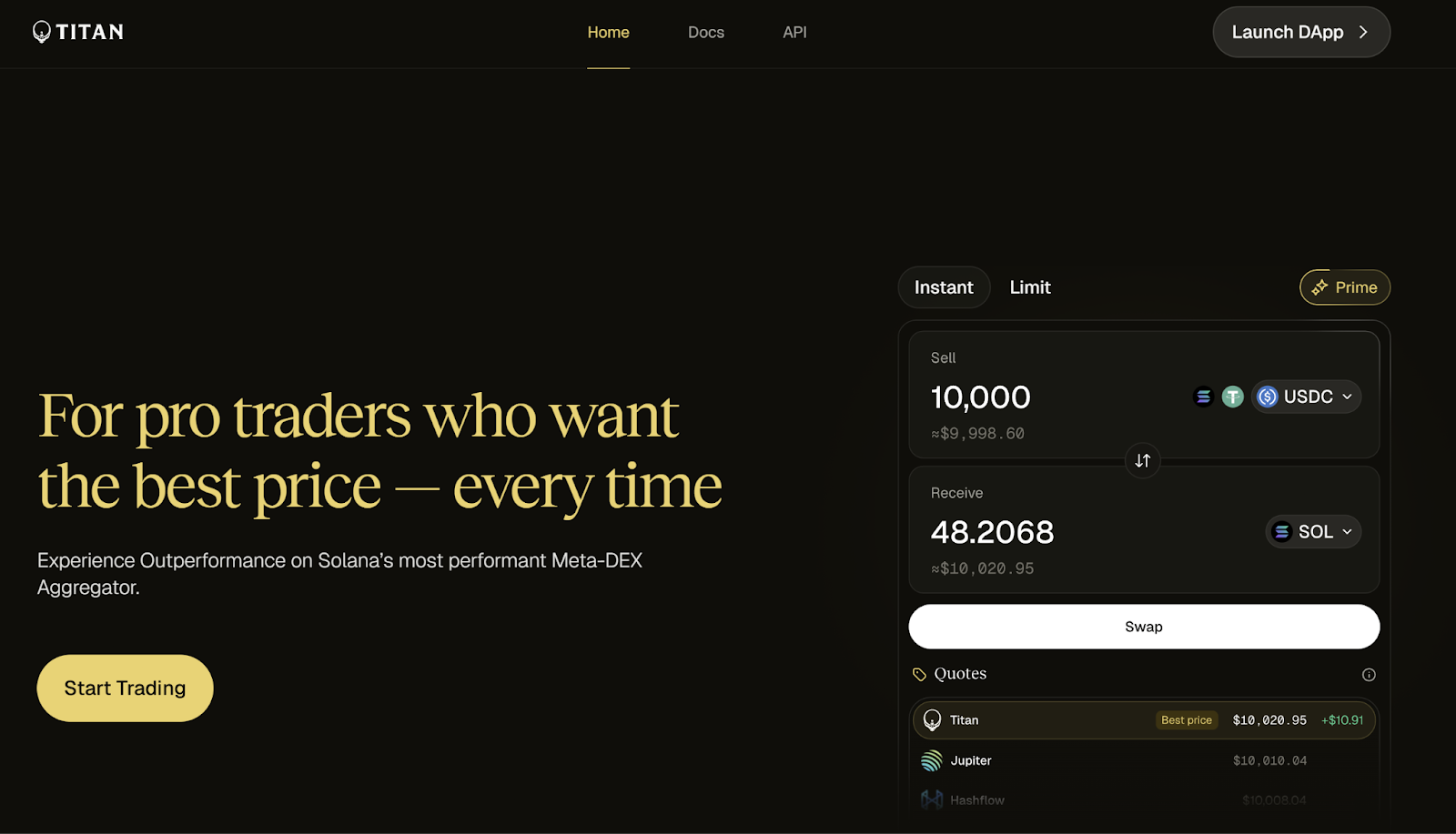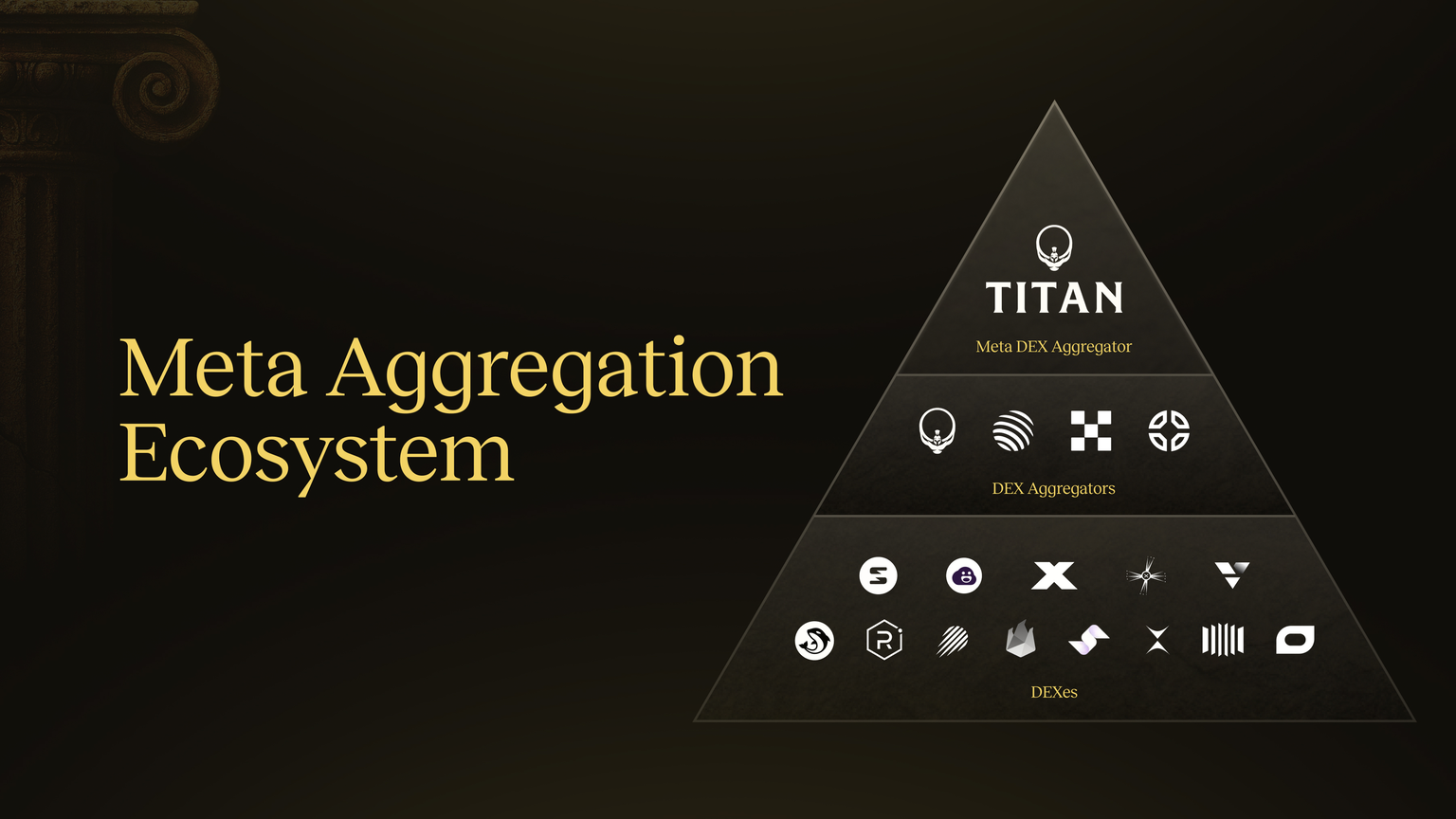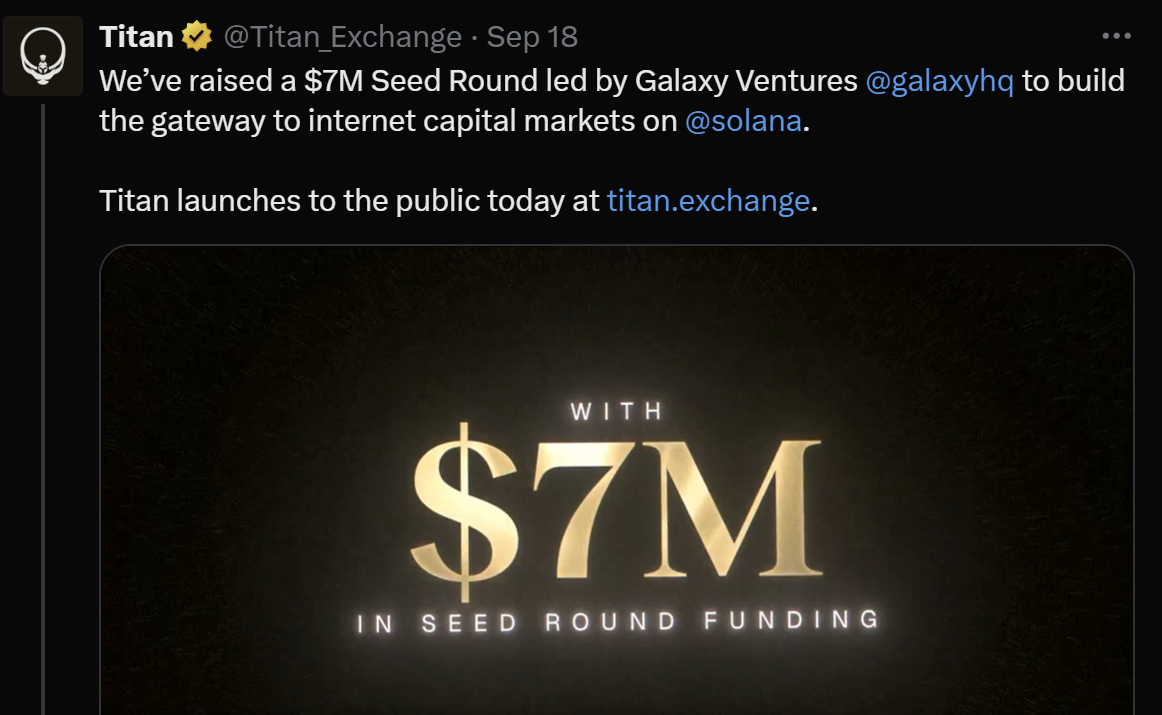What Is Titan? The Meta DEX Aggregator Optimizing Solana Trades
Key Takeaways
- Titan is a meta DEX aggregator built on Solana, designed to deliver the most efficient swaps by combining multiple top DEX routers into one routing layer.
- Its proprietary Argos routing engine uses optimization-based algorithms and real-time on-chain simulation to minimize slippage and maximize price accuracy.
- Prime Mode automates trade settings with zero swap fees and MEV protection powered by Jito and Nozomi.
- Backed by Galaxy Ventures, Titan has raised over $10.5 million and processed billions in swap volume since launch.
- The roadmap includes expanding the Titan Prime API, deeper DeFi integrations, and new institutional-grade routing tools.
What Is Titan?
Titan is a meta DEX aggregator built on the Solana blockchain, designed to deliver the best possible swap execution by aggregating top DEX routers including their own proprietary Argos router. Unlike traditional aggregators that just source liquidity directly from DEX pools, Titan aggregates other DEX aggregators, making it a “layer above aggregators.”
By pulling real-time quotes from top routing engines (like Titan Argos, Jupiter, OKX, Dflow), Titan’s system automatically selects the most efficient trade path with the lowest slippage and best price. Titan Argos’ unique routing algorithm has outperformed competing aggregators on Titan roughly 87% of the time, according to internal benchmarks published by the team.
Titan’s vision is to become the execution layer for Solana DeFi, enabling traders, wallets, and platforms to access deep liquidity with zero swap fees, smart routing, and high-speed execution, all while maintaining the composability of Solana’s ecosystem.

Technical Architecture: How Titan Powers Meta-Aggregation on Solana
Titan’s architecture is built around a meta-aggregation framework designed for Solana’s high-speed, low-latency network. Titan consolidates data from multiple top Solana routers across the ecosystem and continuously evaluates every possible trade path in real time.
At the center of this system is Argos, Titan’s proprietary optimization-based routing engine. While many DEX aggregators rely on shortest-path algorithms that simplify routing by excluding smaller pools, Argos takes a more advanced approach.
It dynamically factors in:
- Pool depth and price impact
- Transaction fees and network latency
- MEV exposure and slippage risk
Every quote is simulated directly on the same block, ensuring all routes are compared under identical conditions. This live-simulation process allows Titan to re-evaluate and optimize swaps continuously until execution, reducing slippage and pricing drift caused by network congestion or delayed quotes.
According to recent Titan public benchmarks, Argos delivered superior routing in roughly 87% of swap comparisons, outperforming other Solana routing engines since their public launch.

What Makes Titan Stand Out
Titan stands out from other Solana DEX aggregators through its execution quality, transparency, and infrastructure design.
- Consistent Outperformance: Titan’s architecture delivers better pricing and lower slippage, with Argos achieving 87% win rates in swap comparisons.
- Zero-Fee Model: No swap fees, traders keep the full benefit of optimized routing.
- Prime Mode Automation: Automatically manages slippage, fees, and landing configuration, with MEV protection powered by Jito and Nozomi.
- Transparent Results: The Trading Edge dashboard tracks total fee savings and outperformance for each user, offering measurable proof of value.
- Developer Integration: The Titan Prime API enables wallets, bots, and DeFi platforms to integrate Titan’s routing logic directly into their systems.
Trade Optimization: Prime Mode and Custom Settings
Titan gives traders two ways to manage swap execution, Prime Mode for automatic optimization and Custom Settings for manual control. Both are designed to maximize performance while keeping trades simple and transparent.
Prime Mode
Prime Mode is Titan’s default execution system that automatically adjusts transaction parameters for the best results.
It optimizes slippage tolerance, transaction landing, and fee levels in real time using Titan’s routing intelligence. All trades in Prime Mode include automatic MEV and sandwich protection, powered by Jito and Nozomi, helping users avoid front-running and unfair execution.
Unlike many DEX services that charge up to a 10 bps fee, Titan Prime operates with zero swap fees, allowing traders to capture the full benefit of routing efficiency. According to Titan’s internal data, Prime Mode can add up to 20 basis points of extra value per trade through its optimization process.
Custom Settings
Advanced users can choose Manual Mode for more granular control.
Key configurable parameters include:
- Slippage Tolerance: Separate options for base-token and stable/LST pairs.
- Transaction Fee Mode: Auto (Titan adjusts fees dynamically) or Custom (user-defined).
- AMM Exclusion: Users can exclude specific AMMs from route selection for preference or testing.
These settings give professional traders flexibility without compromising Titan’s routing precision.
Funding and Launch Overview
Titan’s steady growth and investor backing demonstrate strong momentum in its mission to become Solana’s core liquidity layer.
Funding Rounds
Titan has raised over $10.5 million to date, including a $7 million seed round led by Galaxy Ventures, and an earlier $3.5 million pre-seed used to develop its Argos routing engine and Titan Prime API.
Private Beta Milestone
Before its public release, Titan processed over $1.5 billion in swap volume during its private beta (since March 2025), validating demand for its meta-aggregation model and routing precision.
Public Launch
Titan officially launched on September 18, 2025. Within its first week, it processed over $550 million in additional non-API trading volume, with roughly 87% of trades routed through Argos due to superior pricing outcomes.
New Features
Following the launch, Titan introduced Trading Edge, an analytics layer that tracks users’ total fee savings, outperformance, and transaction history for full on-chain transparency.

Titan’s Strengths and Challenges on Solana
Strengths
- Proven Performance: Titan’s Argos routing engine outperformed competitors in 87% of trades, processing over $550M in the first week of public launch.
- Zero Swap Fees: Titan charges no trading fees, allowing users to capture the full edge of optimal routing.
- Meta-Aggregation Advantage: By aggregating across multiple aggregators, Titan accesses deeper liquidity and more accurate pricing than single-source DEXs.
- High Transparency & User Insights: Features like Trading Edge and Transaction History show users their total savings and routing performance, rare transparency in DeFi.
- Strong Backing: Supported by Galaxy Ventures and other Web3 investors, giving Titan credibility and development runway.
Challenges
- Verification of Performance: Titan’s win-rate data is self-reported, not yet verified by independent auditors.
- Adoption Curve: Competing with established aggregators like Jupiter requires strong wallet integrations and consistent results.
- Scalability Under Volume: Sustaining real-time routing across billions in volume may test Solana network capacity and Titan’s backend performance.
- Revenue Model: Zero-fee swaps attract users but raise questions about long-term monetization and sustainability.
- Ecosystem Dependence: Titan’s success depends on the stability and liquidity of Solana’s DeFi ecosystem, which can fluctuate with market cycles.
Roadmap and Future Outlook
Titan is entering its next growth phase, focused on expanding infrastructure, integrations, and data transparency across Solana DeFi.
Prime API Expansion: Rolling out Solana’s most performant meta-DEX aggregator API, allowing wallets, bots, and DeFi apps to integrate Titan’s routing engine directly. Early access is live via public waitlist.
Ecosystem Integrations: Strengthening partnerships with wallets, trading platforms, and institutional DeFi tools to route swaps automatically through Titan’s Argos engine.
Enhanced Analytics: Expanding the Trading Edge dashboard to include more granular data on fee savings, execution performance, and route transparency.
Institutional-Grade APIs: Developing routing tools designed for liquidity providers and high-volume traders, offering customizable, low-latency execution.
Community Speculation: While no token has been confirmed, community discussions suggest potential utility or governance features in Titan’s future ecosystem.
Conclusion
Titan is redefining DEX aggregation on Solana through meta-aggregation, zero-fee swaps, and its high-performance Argos routing engine. Backed by Galaxy Ventures and already processing billions in volume, Titan is evolving into Solana’s core liquidity layer for both traders and developers.
While it still needs independent performance validation and a clear monetization model, Titan’s early success and transparency make it one of the most promising projects in Solana DeFi.
Ready to experience Titan’s routing power firsthand? Download the Backpack Wallet to explore Titan’s integration and start swapping on Solana with zero fees and optimized execution.




